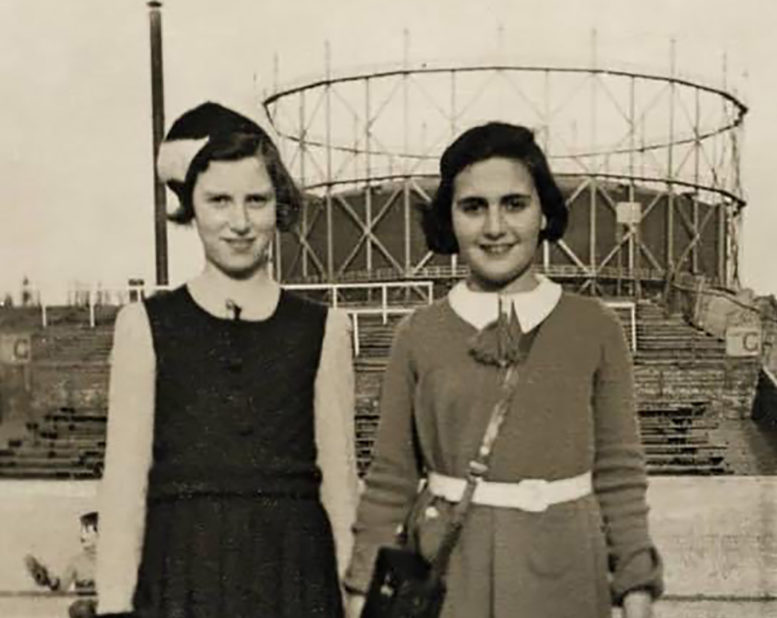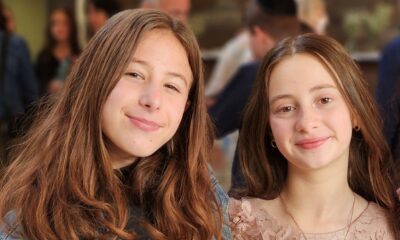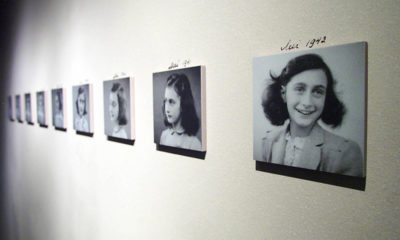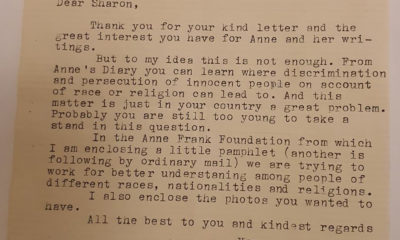
Featured Item

SA family’s hidden link to Margot Frank
Published
2 years agoon
The photograph shows two carefree teenage girls ice-skating on the frozen canals of Amsterdam. The one escaped the Nazis and went to America before coming to South Africa. The other went into hiding in a secret annex, and perished alongside her more famous sister in the Bergen-Belsen concentration camp.
“This photo was taken by Otto Frank in December 1938. It shows my late mother, Hetty Ludel [left], with Margot Frank,” says Jeffrey Zurel from his home in Johannesburg. “She and Margot were very good friends. They attended the Jekerstraat School, were members of the same Zionist youth movement, Maccabi Hatzair, and regularly played tennis together. They were teenage girls and Anne was the “pesky younger sister”, according to my mom!” Margot closely resembles Anne in this particular photograph.
The two girls corresponded right through the war, even while Margot was in hiding. In fact, it was Margot being called up to a labour camp that prompted the Frank family to go into hiding the very next day.
“In their letters, they would talk about boyfriends and make-up, typical teenage things. Then the letters suddenly stopped. My mother didn’t know what happened to her friend until years later, and she was devastated,” says Zurel. The letters between the two were given to Otto Frank after the war.
“The picture of my mom and Margot ice-skating is housed in the Anne Frank House museum in Amsterdam,” says Zurel. “When the museum brought an exhibition to South Africa, a friend called my mom and said, ‘I just saw a picture of you at the exhibition preview!’ She didn’t even know it existed. She did, however, with my dad, manage to attend Nelson Mandela’s formal opening of the exhibition.”
Zurel’s mother emigrated to South Africa in 1947, and married his father, Mark Zurel, who she knew from their childhood in Amsterdam. Zurel and his brother, Bryan, were born in Johannesburg in 1950 and 1953 respectively, and grew up there. Meanwhile, Otto Frank was trying to pick up the pieces after losing his precious daughters, wife, and family in the Holocaust. He corresponded with people all over the world, including Robin Sharon Papayanni, who later donated his letter to the Cape Town Holocaust & Genocide Centre (CTHGC). When Zurel saw coverage of this in a recent issue of the SA Jewish Report, he decided to share the photograph of his mother and Margot with the newspaper.
But how did he come upon the photograph? “Well, out of the blue, a large envelope marked ‘The Anne Frank Foundation’ landed on my desk in Antwerp,” says Zurel, who lived in Belgium for 35 years before returning to South Africa in 2006. “Along with the explanatory letter from the foundation, was the photo of my mom and Margot, with a stamp across it saying ‘archief’. In 2006, weeks before relocating to South Africa, I got wind of a book, written by another of my mother’s schoolmates, which was being serialised in a well-known magazine titled Trouw.
“The entire book was dedicated to Margot and her friends, something that truly touched Otto Frank, who appreciated the fact that his ‘forgotten’ daughter was being highlighted. The book is titled Margot Frank en de Anderen (Margot Frank and the Others).
“I made contact with [the author], Anco Mali, and after lengthy negotiations with publishers, my wife and I drove 150km to visit her in a small village in the Netherlands – all this on mo’ed Pesach 2006 with our matzah sandwiches and all!” recalls Zurel.
In an emotional meeting, Mali shared copies of “autograph books” which contained “dedications” between her, Hetty, and Margot. She also showed him correspondence between Otto Frank and a fellow schoolmate, a certain Mrs de Knijff, from after the war, discussing the whereabouts of Margot’s former classmates.
“He somehow knew the exact address of my mom who was married and living in South Africa,” says Zurel. He now has a copy of that letter, and shares a translation of sections that mention Margot and his mother:
“Dear Mrs de Knijff,
Upon receiving your kind letter I was truly surprised and would like to heartily thank you for all you’ve written about Margot.
Anne has gained ‘popularity’ via her diary whereas Margot’s memory somehow seems to be ‘short done’; but naturally not in my eyes!
Therefore, it’s truly comforting to me when I see that ‘my Margootje’s’ memory lives on in the hearts of her school friends.
I know that Hetty Ludel is married and lives in South Africa. Her address is 43 Desborough Avenue, Winston Ridge, Johannesburg. Her father is often in Amsterdam, residing at number 3, JJ Viottastraat.
It’s extremely kind of you to allow me access to your poëzieboekje [autograph book] in which Margot has written some ‘dedications’. If it’s not too much trouble, could you please send [a copy of] same to me as a ‘keepsake’.
I hope that you and the family are well and wish you all the best.
With friendly greetings, yours Otto Frank.”
The photograph, letter, and autograph book that Zurel has in his possession are copies. The recent coverage of the Otto Frank letter being housed at the CTHGC led him to correspond with the centre so that these items may also find a place there.
Zurel’s mother had a fascinating war story of her own. She was interviewed by the Spielberg USC Shoah Foundation in 1995. Her father, Bernard Ludel, would be first in line day after day at the American Embassy in Amsterdam, trying to secure visas for his wife, two daughters, and himself to travel to New York. These were finally secured, and they left the Netherlands in 1944.
Just prior to departing by boat, an unknown gentleman handed her father a clothes brush with the strict instruction, “Do not open this brush until you’ve arrived safely in New York!”
On opening it in New York, they found a few hundred US dollars “which sustained us for about three months”, his mother recalled. “All we could afford for those three months was water and doughnuts!” Hetty passed away in 2003.
“The only thing my mother and Margot didn’t do together was rowing,” recalls Zurel. “Margot was an excellent rower. At one stage, she wasn’t allowed to participate because she was Jewish, and her teammates said that if she wasn’t allowed, they wouldn’t participate either.”
It’s these kinds of anecdotes that Zurel’s mother passed on to him before she died. Now, he carries this small slice of history and the legacy of a girl who has always been overshadowed by her sister, but had the potential to shine just as bright if the Nazis hadn’t snuffed out her life.










